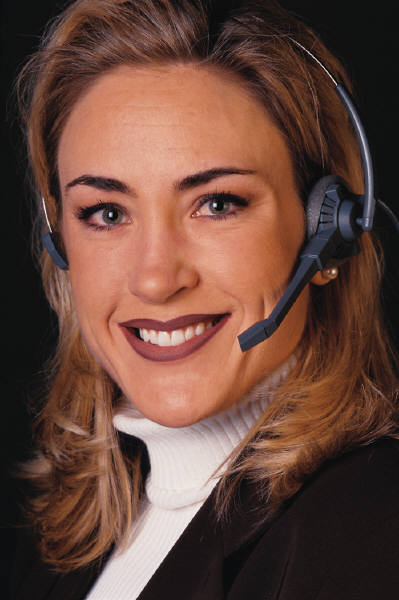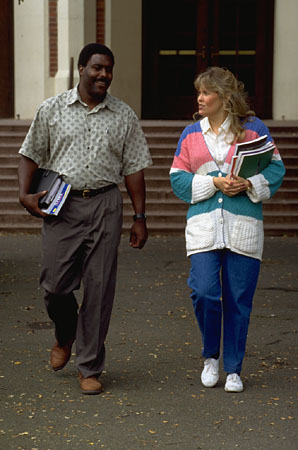|

 Parent's
Judicial Voting Guide from ACFC & Childsbestinterest.org Parent's
Judicial Voting Guide from ACFC & Childsbestinterest.org
 NEW!
Look for LIVE HELP throughout the site! NEW!
Look for LIVE HELP throughout the site!
|

If an SFM staff member is online,
you can get the help you need live! Thanks to Human Click,
you can enter a chat help session with any online staffer with one
click. If not, you will be prompted to leave a message... which
will be answered within 24 hours! We're glad you're here!
|




|
|
Working With Your Child's School

Since few custodial parents take the time or make
the effort to keep the other parent informed of a child's progress and
school activities, noncustodial parents who want to know anything
about their child's school progress, performance, and activities
usually have to get that information directly from the school.
As a divorced parent (and especially as a non-custodial parent) it is
important to have a good relationship with the teachers and staff at
your child's school; when you do, they're more likely to communicate
with you, share information with you, and, if the opportunity presents
itself, endorse you as a suitable custodial parent. This is important,
since the child's teachers may be contacted by evaluators as they
attempt to determine who would be the most appropriate (read:
custodial) parent for the child. Teachers and staff are sometimes
called upon to testify in court as to a child's academic progress or
behavior, as well as to the parent's involvement with the child's
education. Because evaluators and judges place great weight on how
involved a parent is, you will want the staff and teachers to remember
you well and be able to say good things about you if they are ever
contacted by an evaluator or required to testify.
Involvement
Getting involved with some of the school programs is an excellent way
to meet the staff and earn some measure of respect from them. Even if
you get involved in just one of the school's programs, you'll
find that associating with the school staff builds trust and
familiarity. (The teachers and staff understand that your time is
limited; they don't expect you to get involved in every school
function or event.) The better they feel about you, though more likely
it is that they would see you as a person they can relate to instead
of just another parent.
Joining the PTA is always a good way to become meet and become
familiar with the school staff. PTA dues are usually only a few
dollars a year, well within range of even the most financially
hard-pressed parents. The money goes to a good cause, and it shows the
school that you're an involved parent. Just by showing up at the PTA
meetings (there only a few over the course of a year) you'll be
recognized by the teachers and school administration as a "PTA
supporter", another nice thing that the school staff can say about
you. Attending PTA meetings is one of the easiest and most effective
ways to build familiarity with the school staff. (We know- PTA
meetings sound boring, right? Sometimes they are, even we
admit it, but we're not suggesting you go to every single one. Attend
them as time permits.) Always attend parent-teacher conferences unless
distance prevents you from doing so.
You might also offer to donate some of your time and expertise;
depending upon what the school might happen to need, your skills could
be quite useful to them. Maybe you could help out around the school
office- even if it's just stuffing envelopes, the fact that you're
offering to help will make a good impression on them. Helping out in
the classroom once in a while is an excellent way to establish a
rapport with your child's teacher- most of the time they will be
genuinely grateful for the assistance, and it'll give them a chance to
get to know you a little better. Also, many teachers would be glad to
have you along for some extra help on field trips and class outings.
E-mail is a great way to stay in touch with the teacher if you don't
live close by. The nice thing about using email is that you have a
permanent record of what is said by the teacher. An occasional email
is fine; just don't bombard the teacher with too much- they have
plenty to do as it is. If it's legal where you live, you may want to
consider recording your conversations with the school, especially if
they're uncooperative with you.
You must also consider how closely you want to monitor your child's
progress. It is quite within the law, in some states, for you to
insist that everything that goes home with the child must also be sent
to you, including completed homework assignments, tests, papers, and
handouts. We caution you about insisting on this, however, because it
places a heavy burden on the teacher and can cause resentment. If you
intend to request something like this, you should establish a good
rapport with the teacher first. Set up a time when you will come in
each week and make the copies or pick them up. In practice, few
teachers are willing to do this, and they will only do so when
pressured, if at all.
Courtesy
Exercise courtesy when dealing with the school staff, teachers, and
administration. A smile and calm, friendly attitude will nearly always
get you farther than yelling and banging your fist on the counter
will. Treat the staff politely and attempt to work with them fairly;
you can always get tough later if they're uncooperative or hostile to
you. Keep in mind that in most cases, the things you are requesting
from the school are a matter of record and law, covered under the
Family
Educational Rights and Privacy Act (FERPA). If this is the case,
the school may initially oppose you, but eventually they will
be forced to cooperate with you. Not abiding by FERPA can cause a
school to lose any federal funding it receives, and no school will
deliberately lose its federal funding just so they can deny you access
to your child's scholastic records.
For example, if the school is refusing to give you your child's report
cards, it's quite possible that they are unaware of the laws regarding
parents
access to school records, and are simply acting out of ignorance.
The office staff at a school is much like office staff anywhere-
they'll cooperate with you as long as you can show them that what you
are asking for is In The Rules. By politely showing them that
FERPA gives
you the right under the law to access your child's records, they'll be
a lot more willing to cooperate than if you come in, waving a copy of
FERPA around
in the air and demanding to see your child's report cards "right now".
Make sure they understand that you are interested in your child's
progress at school because you are a concerned, involved, and loving
parent. You are not 'spying' on your ex or trying to cause problems
for the school or the teachers.
In case of friction or a dispute with the school's office staff, don't
waste time and energy with them; you'll probably just make things
worse. Instead, contact their superiors; start with the school
Principal and make your request. If the Principal is uncooperative you
may find it necessary to go to the District Administrator. Rarely will
you have to have to go any higher up the chain of command than this,
but but if it becomes necessary, don't hesitate. At some point you
will reach someone who will understand the legitimacy and legality of
your request, and who will, directly or indirectly, instruct the
office staff to cooperate with you.
Uncooperative Educators
Occasionally you may encounter a teacher who is uncooperative, who
withholds information from you, or refuses to discuss your child's
needs or scholastic development with you. The teacher may inform you
that they've talked to the other parent already, and ask (or tell) you
to find out from the other parent what was discussed. If you persist
in attempting to get information from this teacher, the teacher may
even go so far as to say that you are "harassing" them.
This is unacceptable behavior from any educator. Should you find
yourself dealing with this kind of situation, you should immediately
put the school and the teacher on notice, as detailed below.
The first step is to meet with the Principal and have an 'informal'
chat about the apparent 'attitude problem' that this teacher has. It's
also a good idea to write out a formal complaint and insist that the
Principal place it in the teacher's permanent file. After a few of
those get stuck in there, chances are the teacher will be a bit more
cooperative.
Stress that you'd 'prefer to keep things informal' and 'not have them
escalate to more formal settings' (like a disciplinary review board,
school board, etc). Say this the right way and the Principal will get
the message.
Let them know that you will not accept answers like "I talked to Ms.
XXX about this". You're entitled to have open communication with your
child's teacher, and if they can't provide this then he or she needs
to find another line of work.
If the teacher says anything like "I talked to Ms. XXX about this'",
immediately stop and put them on the spot: "Really? So you're
refusing to discuss the academic performance of one of your pupils
with the pupil's own parent?" Then stop- let the teacher mull
this over and respond, and give them all the time they need. :)
If are the teacher tries to say that you're harassing him or her, just
stop right there and put them on the spot again: "Are you stating
that my wanting to discuss my child's academic performance is
'harassing' you? I don't believe my attorney would agree. Perhaps the
Education District attorney should meet with my attorney and the
Principal so they can discuss this in detail."
Recognition
Finally, here are a couple of easy ways to get your face known at your
child's school:
These days, virtually all public schools require visitors to wear
nametags. Don't use their cheap, disposable paper nametags, make up
your own cool permanent one instead. And don't put your name
on it (that's what everybody does), use your child's name and
put "John's Dad" or "I'm John's Dad" on it. Make the "Dad" just a
little bigger than the rest of the lettering. :) This forces the
school staff to think of you as a father, not as a visitor or
'part-time parent'. The first few times I wore my "John's Dad" nametag
around my son's school, the staff members kept coming up to me and
asking "What's your name?". "I'm Bill Smith, John's father", I'd
reply, pointing to my nametag. It was actually a good way to meet the
teachers and staff. Pretty soon, they all knew my name, who I was,
etc. etc. and they all felt comfortable with me.
People will remember the nametag. People who can't even remember my
name will come up to me and say "Oh, aren't you John's dad?" When
someone introduces me at school, they're likely to say "This is Bill,
he's John's father..." Again, this reinforces the idea that you are
somebody important in this child's life, not just a visitor.
If your child has a birthday during the school year, ask the teacher
in advance if you can bring some birthday treats (like cupcakes and
juice) for the class that day. Most teachers will agree to this. While
you're there, don't forget to ask if you can help out with anything,
and to give the teacher a business card or contact number. Let them
know that you would welcome the opportunity to discuss any issues
regarding your child, and that they can call you any time. And don't
forget to wear your nametag. :)
Copyright
FRTC 2000. All Rights
Reserved.
May be freely copied and used provided the FRTC attribution line is
kept intact and the FRTC link is included.
Page Location: http://www.deltabravo.net/custody/school.htm
|
|

RELATED READING:

"Striving for Peace:
Managing Conflict in Non-Custodial Homes" is the MUST HAVE guide for
every non-custodial home! Enlightening information on the
reasons behind the often difficult behavior of ex-spouses, and
practical information on how to combat the daily strife of
non-custodial parenthood. Free yourself and your family...
Download the eBook Now!

Family Life magazine said, "In many ways, dealing with an
uncooperative former spouse is like dealing with a difficult child:
You've got to set limits, express your feelings clearly, and pick you
battles with care. The authors' strategies for mediating the many
issues in a separated parent's life are apt and easy to apply."

Sue Patton Thoele's book, "The Courage
to Be a Stepmom" is well written and speaks to stepmothers as not just
stepmothers but as women and caretakers who need to remember to take
care of themselves as well as their stepfamilies. Her book
demonstrates to stepmothers not only the various stepmothering issues
and coping strategies but also how to take care of their spiritual,
mental, and physical well being throughout the process. Ms
Thoele's book also sites personal experiences from her own twenty-five
years of stepmothering and her book is wholesome, healing, and easy to
read.
 William
C. Klatte's "Live-Away Dads" is a reassuring and practical guide for
divorced fathers who want to remain actively involved parents. A
social worker and psychotherapist who has been a custody advisor to
the Illinois Courts, Klatte rightly counsels fathers to come to terms
with their emotions, a crucial first step toward diffusing conflict.
Next, he expertly leads fathers through the stages of setting up
visitation, cooperating with mothers to improve communication, and
working on parenting skills. William
C. Klatte's "Live-Away Dads" is a reassuring and practical guide for
divorced fathers who want to remain actively involved parents. A
social worker and psychotherapist who has been a custody advisor to
the Illinois Courts, Klatte rightly counsels fathers to come to terms
with their emotions, a crucial first step toward diffusing conflict.
Next, he expertly leads fathers through the stages of setting up
visitation, cooperating with mothers to improve communication, and
working on parenting skills.
 Pickhardt
shares his years of experience as a psychologist and offers a very
useful resource for step fathers and bio-fathers for understanding the
multiple changes that affect step families. Issues of multiple
alliances, boundaries, even gender differences about step fathers
relating to step sons and step daughters, and more are all included in
this book which helps normalize the process of step family
development. He is very accurate in his description of the
developmental process of step-family development, estimating a minimum
of 2 years for step families to come together as a working unit Pickhardt
shares his years of experience as a psychologist and offers a very
useful resource for step fathers and bio-fathers for understanding the
multiple changes that affect step families. Issues of multiple
alliances, boundaries, even gender differences about step fathers
relating to step sons and step daughters, and more are all included in
this book which helps normalize the process of step family
development. He is very accurate in his description of the
developmental process of step-family development, estimating a minimum
of 2 years for step families to come together as a working unit
 Since
the divorce procedure has become, legally speaking, nearly as
innocuous as apple pie in America, the task has fallen to
psychologists such as Shulman to provide both adults and children with
the tools to get on with their lives. In this book, devoted to the
immense parenting problems of divorce, no space is wasted with
esoteric or gushy narrative; Shulman writes in the style of a how-to
manual. The book nonetheless achieves its stated goal of being "an
unintimidating and practical guide to help with the adjustment
process." From the basics of "Creating a Co-Parenting Plan" to the
specifics of handling the problems of children from infancy on up to
age 18 in dealing with the divorce milieu, Shulman provides practical,
straightforward capsules often broken down into useful steps. Though
this is most suitable for divorced parents as a "ready reference"
guide for thinking quickly on one's feet, public libraries would
certainly do patrons a service by adding it to their collections Since
the divorce procedure has become, legally speaking, nearly as
innocuous as apple pie in America, the task has fallen to
psychologists such as Shulman to provide both adults and children with
the tools to get on with their lives. In this book, devoted to the
immense parenting problems of divorce, no space is wasted with
esoteric or gushy narrative; Shulman writes in the style of a how-to
manual. The book nonetheless achieves its stated goal of being "an
unintimidating and practical guide to help with the adjustment
process." From the basics of "Creating a Co-Parenting Plan" to the
specifics of handling the problems of children from infancy on up to
age 18 in dealing with the divorce milieu, Shulman provides practical,
straightforward capsules often broken down into useful steps. Though
this is most suitable for divorced parents as a "ready reference"
guide for thinking quickly on one's feet, public libraries would
certainly do patrons a service by adding it to their collections
LONG DISTANCE
PARENTS!!
Call anywhere in the Continental United States for FREE from your PC!!
|


